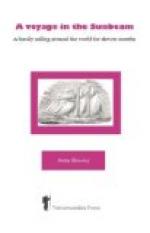For two hours we could see the smoke pouring from various portions of the ill-fated barque. Our men, who had brought off the last of her crew, reported that, as they left her, flames were just beginning to burst from the fore-hatchway; and it was therefore certain that the rescue had not taken place an hour too soon. Whilst we were at dinner, Powell called us up on deck to look at her again, when we found that she was blazing like a tar-barrel. The captain was anxious to stay by and see the last of her, but Tom was unwilling to incur the delay which this would have involved. We accordingly got up steam, and at nine p.m. steamed round the ‘Monkshaven,’ as close as it was deemed prudent to go. No flames were visible then; only dense volumes of smoke and sparks, issuing from the hatches. The heat, however, was intense, and could be plainly felt, even in the cold night air, as we passed some distance to leeward. All hands were clustered in our rigging, on the deck-house or on the bridge, to see the last of the poor ‘Monkshaven,’ as she was slowly being burnt down to the water’s edge.
She was a large and nearly new (three years old) composite ship, built and found by her owners, Messrs. Smales, of Whitby, of 657 tons burden, and classed A 1 for ten years at Lloyd’s. Her cargo, which consisted of coal for smelting purposes, was a very dangerous one; so much so that Messrs. Nicholas, of Sunderland, from whose mines the coal is procured, have great difficulty in chartering vessels to carry it, and are therefore in the habit of building and using their own ships for the purpose. At Buenos Ayres we were told that, of every three ships carrying this cargo round to Valparaiso or Callao, one catches fire, though the danger is frequently discovered in time to prevent much damage to the vessel or loss of life.
The crew of the ’Monkshaven’—Danes, Norwegians, Swedes, Scotch, and Welsh—appear to be quiet, respectable men. This is fortunate, as an incursion of fifteen rough lawless spirits on board our little vessel would have been rather a serious matter. In their hurry and fright, however, they left all their provisions behind them, and it is no joke to have to provide food for fifteen extra hungry mouths for a week or ten days, with no shops at hand from which to replenish our stores. The sufficiency of the water supply, too, is a matter for serious consideration. We have all been put on half-allowance, and sea-water only is to be used for washing purposes.
[Illustration: Shipwrecked Crew coming on Board.]
Some account of the disaster, as gathered from the lips of various members of the crew at different times, may perhaps be interesting. It seems that, early on Monday morning, the day following that on which the fire was discovered, another barque, the ‘Robert Hinds,’ of Liverpool, was spoken. The captain of that vessel offered to stand by them or do anything in his power to help them; but at that time they had




